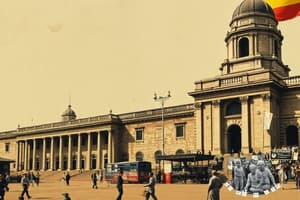Podcast
Questions and Answers
Which political doctrine advocates for a government structured in three branches?
Which political doctrine advocates for a government structured in three branches?
- Utilitarianism
- Marxism
- Federalism
- Montesquieu's Division of Powers (correct)
The Judiciary branch is completely independent in its judicial review and appointments.
The Judiciary branch is completely independent in its judicial review and appointments.
False (B)
What is the primary function of the Legislative branch in relation to the Executive?
What is the primary function of the Legislative branch in relation to the Executive?
To draft and depend on proposals from the Executive.
The concept of __________ focuses on specific functions or criteria to define Administration.
The concept of __________ focuses on specific functions or criteria to define Administration.
What is an example of a constitutional body performing administrative functions?
What is an example of a constitutional body performing administrative functions?
Match the following concepts with their descriptions:
Match the following concepts with their descriptions:
Public bodies and private entities can both perform administrative activities.
Public bodies and private entities can both perform administrative activities.
What historical event led to the modern complex administration replacing ancient structures?
What historical event led to the modern complex administration replacing ancient structures?
What was established by the Division of Powers Doctrine?
What was established by the Division of Powers Doctrine?
The Supreme Court in Spain was created in 1834 with administrative supervision.
The Supreme Court in Spain was created in 1834 with administrative supervision.
What year was the Spanish Constitution enacted that ensured full judicial review of administrative conflicts?
What year was the Spanish Constitution enacted that ensured full judicial review of administrative conflicts?
The _____ principle requires that the public administration must act according to the law.
The _____ principle requires that the public administration must act according to the law.
Match the following key features of public administration with their descriptions:
Match the following key features of public administration with their descriptions:
Which act introduced 'delegated jurisdiction'?
Which act introduced 'delegated jurisdiction'?
Public administration can focus on private interests according to its principles.
Public administration can focus on private interests according to its principles.
In what year did the LJCA expand judicial control over administrative issues?
In what year did the LJCA expand judicial control over administrative issues?
Flashcards are hidden until you start studying
Study Notes
I. Concept
- Division of Powers: Montesquieu's doctrine divides government into three branches: Executive, Legislative, and Judiciary.
- Executive Branch: Comprises the government and the Board of Ministers, responsible for policy implementation.
- Legislative Branch: Dependent on Executive drafts for new laws and policies, creating a reciprocal relationship.
- Judiciary Branch: Independent in judicial review but politically influenced regarding judicial appointments.
- Relationship Between Branches: Frequent interactions, especially Legislative actions reliant on Executive proposals.
- Public Administration: Part of the Executive branch, subject to court monitoring and aligned with the principle of legality, ensuring subordination to Legislative authority.
- Administrative Law: Lack of a definitive understanding of administrative phenomena, with various doctrines proposed for analysis.
- Objective Doctrine: Aims to establish criteria to clearly define the functions of Public Administration.
- Public Service Definition: Lacks consistency historically and contextually; not all administrative actions relate directly to public services.
- Administrative Privileges (Autotutela): Not universally applicable; administrative bodies may operate similarly to private citizens.
- Public Interest Concept: Faces similar challenges as the public service definition, with unclear interpretations.
- Subjective Doctrine: Identifies legal entities categorized as Administration by law.
- Entities with Public Legal Personality: Follows Administrative law and is supervised by Administrative Courts.
- Inadequacies in Administration:
- Constitutional bodies undertake administrative functions, remaining under Administrative law despite a lack of administrative identity.
- Private entities, like concession holders, engaging in administrative tasks are subjected to administrative oversight.
- Public institutions may employ private or civil law frameworks (e.g., labor laws) for certain operations.
- Government’s Dual Role: Functions politically while also managing administrative responsibilities.
II. Origin and Historical Evolution
- Historical Roots: The French Revolution catalyzed modern administration, leading to more complex systems but replacing antiquated structures.
- Division of Powers Impact: Ensured the Executive's independence from traditional political influences while initially excluding any form of judicial review.
- Conseil d’Etat: Established as an independent body to oversee Public Administration, facilitating a "withheld jurisdiction" approach.
- Spain’s Adaptation to Administration:
- 1834: Establishment of the Supreme Court without administrative oversight.
- 1845: Consejo de Estado assumed administrative supervision.
- 1888: Santamaria de Paredes Act introduced the concept of "delegated jurisdiction".
- 1904: Maura Act conferred full jurisdiction relating to administrative matters to the Supreme Court.
- 1956: The Law on Contentious Administrative Jurisdiction (LJCA) expanded judicial control, though limited under Franco’s regime.
- 1978: Spanish Constitution established comprehensive judicial review of administrative disputes.
III. Personification of Public Administration in the Current Legal System
- Legality Principle: Public Administration must operate strictly within the confines of the law.
- Political Influences: Operations are swayed by political agendas, not merely legal mandates.
- Privileged Position: Public Administration reports are assumed accurate, enjoying the principle of autotutela.
- Public Interest Focus: Administrative actions should be aimed exclusively at serving the public interest.
- Organizational Structure: Defined hierarchies and responsibilities are established within administrative proceedings.
- Legal Personality: Administrative structures are recognized as legal entities, distinct from individual officers.
- Public vs. Private Personality: Unique legal frameworks (administrative or private) apply, influencing judicial categorizations.
- Assigned Powers: Powers designated to administrative entities cannot be relinquished; they are integral to the body’s function.
- Single Legal Personality: All administrative actions reflect a unified organizational identity; a unified public record system is mandated.
- Autonomy of Administrative Bodies: Organizational, financial, and operational autonomy is present, except in specific administrative agencies.
- Administrative Agencies:
- Instrumental Administrations: Created to perform specific tasks and provide public services.
- Limited Powers: Operate within specified realms of authority, subject to legal constraints.
Studying That Suits You
Use AI to generate personalized quizzes and flashcards to suit your learning preferences.




